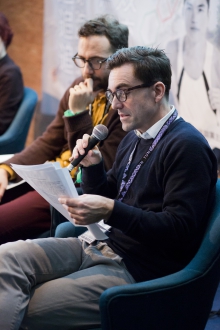Datafied Research: Capture Weather - A Talk About the Weather
Datafied Research: Capture Weather - A Talk About the Weather
"How do you catch a cloud and pin it down?” Rodgers and Hammerstein, The Sound of Music, RCA Victor, 1965. CD.
This panel, featuring participants of the Datafied Research PhD workshop, will consist of a conversation about that ubiquitous conversation starter: the weather. Including the serving of some specially crafted “weather drinks,” audience members will be invited to playfully engage in discussions that touch on such concepts as data and weather, climate and weather, war and weather, forecast and uncertainty. In an age of cloud computing and umbrella revolutions, how might seemingly pervasive but nevertheless locally situated issues around weather be seen to hint at a dialogue on the festival’s main theme of CAPTURE ALL?
About Datafied Research
Datafied Research launches the outcome of a Ph.D. seminar organised by the Centre for Participatory IT at Aarhus University, School of Creative Media at Hong Kong City University and transmediale. It is the fourth of its kind in an ongoing collaboration between transmediale, Aarhus University, and changing partners (Universität der Künste Berlin 2011, Leuphana Universität 2012, and Kunsthal Aarhus 2013). The aims of the events are to address the thematic framework of transmediale as a research topic, and to publish a ‘peer-reviewed’ newspaper to be launched at the festival. Furthermore, the participating researchers are invited to submit their work to the online academic journal APRJA (A Peer Reviewed Journal About Datafied Research).
By addressing Datafied Research, the workshop and the publications address popular notions of datafication; including “the datafied self”,” the datafied city”, “datafied management”, and call for a reflection on the darker forces involved in capturing and using data – also within research itself.
We produce, share, collect, archive, use and misuse, knowingly or not, massive amounts of data, but what does “capture” do to us? What are the inter-subjective relations between data-commodity and human subjects? By asking these questions, the participants seek insights into the logics of data flows between materials, things, data, code, software, interfaces and other stuff that permeates a culture of “capture all”. Rather than merely mimicking the sciences’ use of (big) data, the arts and humanities must explore the complex questions of what datafication does to us, and how we might begin to do things to it.
